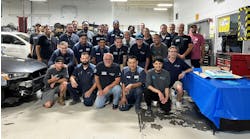At the start of each year, I often ask business owners and managers what new goals they have and how they established them. I often get blank stares.
Except for superficial goals, such as increasing sales 5 percent, increasing net profit 10 percent or getting two more direct repair programs, there is never much there. It takes little thought to set these types of goals and requires less strategy to accomplish them. Whether goals like this are achieved is strictly because of chance, not the actions of the business or its owners and managers.If this is how you relate to your goals and strategy setting accomplishments, join the crowd. The majority of small business owners run their operations this way. Most small business owners operate their businesses to create jobs for themselves, so they're not properly managing and improving their business and its future, according to Michael Gerber, author of the book, The E-Myth. This is true, sadly, whether one owns a pie company, small retail business or collision repair business. Not much goes through small business owners' minds – for that day, minute or second – except daily operations. They also need to be thinking about the sustainability and improvement of their business.
Although most business owners operate this way, it's not correct. The successful ones break out of these bad habits and focus on one of the oldest expressions used by consultants for years: "Begin working on your business, not in your business." This has been said so many times that it has lost its meaning, and many don't understand what it means.
Depending on your business size, you may be required to oversee daily operations, but that must not drown out your other responsibilities as an owner or manager. You have an obligation to the business that no one else does. If there is a structure in place to allow you the opportunity to work on your business, you still must remain focused and not be distracted by your freedom.
One huge problem is that you're solely accountable to yourself often, and when you don't achieve what you should for your business – because you're drowning in daily operations – no one else knows that or can fire you. This is where valuable consultants/coaches often give it to you straight. Many can't take the truth, or simply refuse to listen, but they should.
Requirements in the collision business are increasing. Do you know your business strengths? Do you know your weaknesses? Do you know opportunities and threats to your business? You may recognize these questions as a SWOT (strengths, weaknesses, opportunities and threats) analysis; but this also is a fundamental tool for all businesses, and successful ones use these, along with other fundamental business tools, regularly to make sure they're on the right path. Have you invested in the work to complete these fundamental exercises, or are you too busy fixing cars or playing with your free time?
The sustainability of a business doesn't just depend on hard work, what your employees do or luck. It's a managed outcome of proper planning, implementation commitment and execution. Fundamental business tools are as important as fundamentals of any sport. Building on poor fundamentals can achieve short-term successes, but they lead mostly to great inconsistencies, slumps or failures under pressure.
Has your business been consistent for the past three years? We can blame the economy and lower claims counts in part, but I'd almost bet my house it is mostly caused by poor fundamentals. Are you operating your business in a fundamentally sound manner? If not, call a consultant to improve your business.
Contact info: [email protected]




